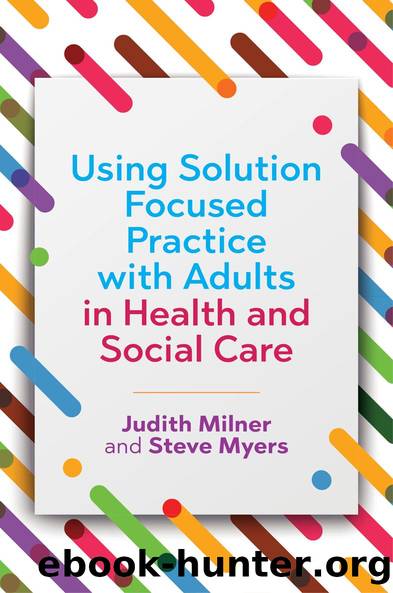Using Solution Focused Practice with Adults in Health and Social Care by Judith Milner Steve Myers

Author:Judith Milner, Steve Myers [Judith Milner, Steve Myers]
Language: eng
Format: epub
Tags: Social Science, Social Work, Medical, Health Care Delivery, Political Science, Public Policy, Social Services & Welfare, Mental Health
ISBN: 9781784503253
Google: DaklDwAAQBAJ
Barnesnoble:
Goodreads: 35399461
Publisher: Jessica Kingsley Publishers
Published: 2017-11-21T00:00:00+00:00
CASE EXAMPLE
A very upset student came to see Steve. She was struggling to get her work in on time and was thinking about withdrawing from the course. She talked about having moved to the area to study following an acrimonious separation from her husband, bringing her three children with her but having few friends or family to support her. She described herself as lacking organisational skills and the focus necessary to complete the work.
Steve asked some gentle questions about how her children had all managed to get to school that day and what they liked for breakfast. She was able to describe her routine for getting the children up, getting washed, having clean clothes, making and eating breakfast, and organising with other parents to share getting the children to school. Steve asked how she had managed to do all that and they began to recognise the organisational skills, strength of character and commitment needed to achieve what she had with the children. They agreed that she would go and be less hard on herself and recognise that she had supermum skills that could translate into superstudent skills.
Steve left the university before she completed her degree, but he received a phone call two years later at his new place of work from her saying that she had just gained a first-class honours degree.
Such conversations increase the likelihood of hope and engagement and thus have potential for change. For example, when there are concerns about a parentâs ability to meet a disabled childâs needs it is much more productive to support changes and move things forward when the worker focuses on those times when the parent has met the childâs needs, however fleetingly. In contrast, if the conversations consistently centre on the presence of unsafe behaviour, it is likely to promote âproblem talkâ as well as make the parent feel like a failure, which could then move them into a position of thinking, âWhatâs the point?â
This is not to say that we should ignore unsafe or inappropriate behaviour as ultimately a vulnerable personâs safety is of paramount importance; however, a useful question in this situation is, âWhen things are going wrong, what do you do to put them right?â For example, if you were struggling with managing your time and the focus of the conversations with your manager was centred on your failure to get reports done on time or meet other deadlines, how would that make you feel? And how helpful would that be in supporting you in meeting deadlines in the future? Conversely, if the conversation focused on times when you have met, or come close to meeting deadlines, helping you discover what was different on those occasions, you are likely to feel more confident that you can do this again. Such a conversation would also help to bring your attention to a detailed plan of action that works best for you. Furthermore, discussions centred on what is/was different begin to construct a description of what life could be like and the differing experiences and possibilities.
Download
This site does not store any files on its server. We only index and link to content provided by other sites. Please contact the content providers to delete copyright contents if any and email us, we'll remove relevant links or contents immediately.
Periodization Training for Sports by Tudor Bompa(8254)
Why We Sleep: Unlocking the Power of Sleep and Dreams by Matthew Walker(6706)
Paper Towns by Green John(5179)
The Immortal Life of Henrietta Lacks by Rebecca Skloot(4576)
The Sports Rules Book by Human Kinetics(4379)
Dynamic Alignment Through Imagery by Eric Franklin(4208)
ACSM's Complete Guide to Fitness & Health by ACSM(4057)
Kaplan MCAT Organic Chemistry Review: Created for MCAT 2015 (Kaplan Test Prep) by Kaplan(4008)
Introduction to Kinesiology by Shirl J. Hoffman(3766)
Livewired by David Eagleman(3764)
The Death of the Heart by Elizabeth Bowen(3610)
The River of Consciousness by Oliver Sacks(3599)
Alchemy and Alchemists by C. J. S. Thompson(3515)
Bad Pharma by Ben Goldacre(3422)
Descartes' Error by Antonio Damasio(3270)
The Emperor of All Maladies: A Biography of Cancer by Siddhartha Mukherjee(3148)
The Gene: An Intimate History by Siddhartha Mukherjee(3094)
The Fate of Rome: Climate, Disease, and the End of an Empire (The Princeton History of the Ancient World) by Kyle Harper(3055)
Kaplan MCAT Behavioral Sciences Review: Created for MCAT 2015 (Kaplan Test Prep) by Kaplan(2984)
